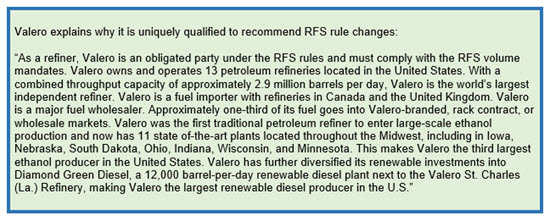WASHINGTON, July 14, 2016 - In comments to the EPA, CVR Energy, which owns merchant refineries in Kansas and Oklahoma, charges the agency with “failure to remove the market constraints that are preventing more renewable fuel from being blended.”
Independent merchant refiners are primarily small-to-medium-sized operations. The majority of the fuels produced at these operations are distributed through a third-party pipeline where the refiner has no control of its fuels once in the pipeline.
As the battle continues over whether EPA should raise or lower its annual Renewable Fuel Standard (RFS) volume requirements for blending ethanol and biodiesel into the nation’s transportation fuel supply, CVR and several other petroleum refiners insist that the best way for EPA to increase biofuels use is to “correct the fundamental flaw in its regulations.”
In his comments letter to EPA related to the agency’s proposed rule for 2017 volume requirement, CVR President and CEO Jack Lipinski calls on EPA to change the “point of obligation” for compliance with the RFS’s renewable volume obligations (RVOs).
Under current RFS rules, the obligated parties are petroleum refiners and importers. CVR wants that obligation switched to the “rack sellers” that own petroleum fuel at the bulk terminal or truck loading terminal just prior to retail. CVR says that switching the compliance obligation from refiners and importers to an equally small number of rack sellers “would align the obligation to blend renewable fuel into the transportation system with the persons who have the ability to do so and would properly align incentives.”
Lipinski’s comments conclude that any blenders currently exempt from compliance “would be incentivized for the first time to increase renewable fuel blending to ensure that they generate sufficient Renewable Identification Numbers (RINs) for compliance.”
Gina Bowman, vice president of government relations for CVR, said the company believes that changing the point of obligation will help the program do what it is intended to do – increase the use of renewable fuels in the transportation fuel supply.
“As a refiner and fertilizer producer, we see the RFS as positive for the Midwest,” Bowman said. “We believe changing the point of obligation helps support the overall intent of the RFS program.”
CVR is not alone in pressing for switching the point of obligation. Valero, a leading U.S. producer of gasoline, ethanol and renewable diesel, submitted a detailed 119-page petition to EPA on June 13 asking for changes in its proposed rule. The petition argues that the current point of obligation is misplaced and “has created multiple problems that impair the RFS program’s proper functioning and prevent it from ensuring that renewables enter the transportation fuel market.”
CVR, Valero, Alon USA, HollyFrontier, Small Business Refiners Coalition, and the American Fuel and Petrochemical Manufacturers trade association all want EPA to switch its RFS point of obligation from some 200 petroleum refiners and importers to an equally small number of major “above the rack” blenders that supply transportation fuels to wholesalers, retailers or ultimate consumers. However, refiners that are currently blending “above the rack” would remain obligated as “above the rack” blenders.
As confirmed at a House Energy and Commerce subcommittee hearing June 22, EPA is considering petitions asking EPA to change the “point of obligation” from petroleum refiners to fuel marketers. Janet McCabe, EPA’s acting administrator in the Office of Air and Radiation, testified that the requested switch is “very much on our minds” and presents an “important issue to look at.”
Valero repeated its call for change in its June 30 comment submitted to EPA, concluding that “Moving the Point of Obligation – a simple definitional change to the rule – will allow greater market penetration of renewable fuels and may be the single most effective reform of the RFS program.”

Valero insists EPA could make the switch easily and that the benefits would:
Bowman pointed out that as a petroleum refiner, CVR is obligated under current RFS rules to either generate or purchase RINs to comply with the national biofuels volume mandate. However, as an independent merchant refiner, CVR does not have control over its fuels once distributed in the third-party pipeline, which means it has no control over the fuels being blended. Therefore, CVR must purchase RINs. She said one costly result is that “RINs are CVR Refining’s single biggest expense, exceeding our labor costs, our maintenance costs and even our fuel costs.” The CVR comments letter states that “since 2013, CVR Refining has spent nearly $500 million on RINs and, at current prices, CVR Refining estimates that its RINs exposure is likely to approach $200 million for 2016.”
Key biofuels supporters reject the multiplying appeals to EPA to make blenders rather than refiners responsible for RFS compliance. Anne Steckel, vice president of federal affairs with the National Biodiesel Board, told Agri-Pulse that her members “don’t think that there’s really anything wrong right now with the point of obligation where it is.” And Bob Dinneen, president and CEO of the Renewable Fuels Association, said that moving the point of obligation would “put the power of the program in the hands of the people who are most interested in killing the program.”
Dinneen said the change would open the door for refiners to simply decide against sending the right product to the newly obligated parties, whose hands would then be tied. “If they change the obligation, they are rewarding the people that didn’t make (infrastructure investments) and have tried not to make the program work,” he said. “That just doesn't make a great deal of sense to me.”
Bowman said that “there is a misconception out there that small-to-medium-sized independent merchant refiners should invest in infrastructure. I don’t think there is a strong understanding of what that truly means. CVR would have to purchase a retail chain in order to add the needed infrastructure, which is impractical and impossible. We are not a retailer nor are we set up to be one.”
#30
For more news, go to: www.Agri-Pulse.com